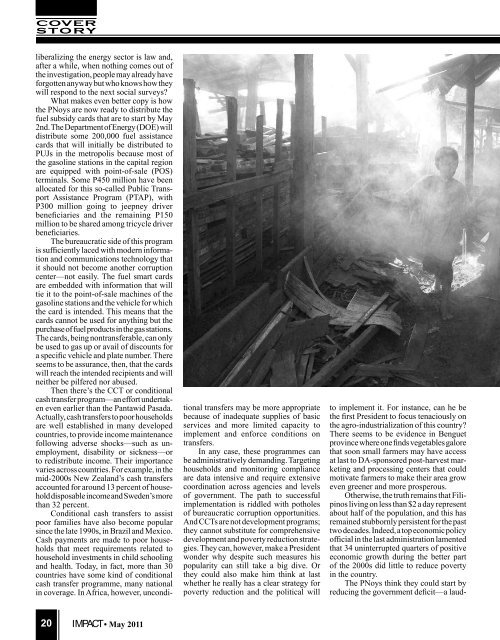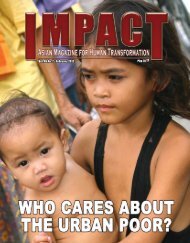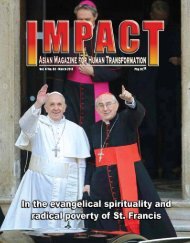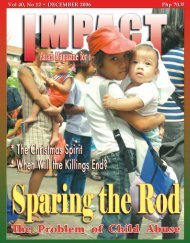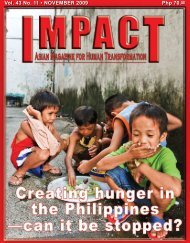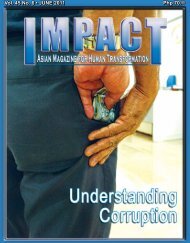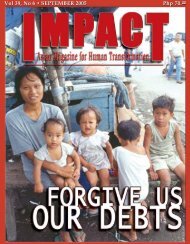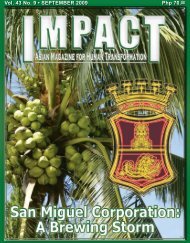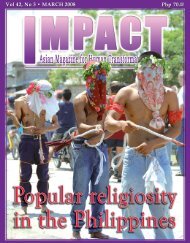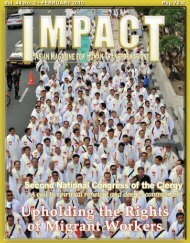Php 70.00 Vol. 45 No. 5 • MAY 2011 - IMPACT Magazine Online!
Php 70.00 Vol. 45 No. 5 • MAY 2011 - IMPACT Magazine Online!
Php 70.00 Vol. 45 No. 5 • MAY 2011 - IMPACT Magazine Online!
Create successful ePaper yourself
Turn your PDF publications into a flip-book with our unique Google optimized e-Paper software.
COVER<br />
STORY<br />
Who feels better now after a year of Aquino economy?<br />
liberalizing the energy sector is law and,<br />
after a while, when nothing comes out of<br />
the investigation, people may already have<br />
forgotten anyway but who knows how they<br />
will respond to the next social surveys?<br />
What makes even better copy is how<br />
the P<strong>No</strong>ys are now ready to distribute the<br />
fuel subsidy cards that are to start by May<br />
2nd. The Department of Energy (DOE) will<br />
distribute some 200,000 fuel assistance<br />
cards that will initially be distributed to<br />
PUJs in the metropolis because most of<br />
the gasoline stations in the capital region<br />
are equipped with point-of-sale (POS)<br />
terminals. Some P<strong>45</strong>0 million have been<br />
allocated for this so-called Public Transport<br />
Assistance Program (PTAP), with<br />
P300 million going to jeepney driver<br />
beneficiaries and the remaining P150<br />
million to be shared among tricycle driver<br />
beneficiaries.<br />
The bureaucratic side of this program<br />
is sufficiently laced with modern information<br />
and communications technology that<br />
it should not become another corruption<br />
center—not easily. The fuel smart cards<br />
are embedded with information that will<br />
tie it to the point-of-sale machines of the<br />
gasoline stations and the vehicle for which<br />
the card is intended. This means that the<br />
cards cannot be used for anything but the<br />
purchase of fuel products in the gas stations.<br />
The cards, being nontransferable, can only<br />
be used to gas up or avail of discounts for<br />
a specific vehicle and plate number. There<br />
seems to be assurance, then, that the cards<br />
will reach the intended recipients and will<br />
neither be pilfered nor abused.<br />
Then there’s the CCT or conditional<br />
cash transfer program—an effort undertaken<br />
even earlier than the Pantawid Pasada.<br />
Actually, cash transfers to poor households<br />
are well established in many developed<br />
countries, to provide income maintenance<br />
following adverse shocks—such as unemployment,<br />
disability or sickness—or<br />
to redistribute income. Their importance<br />
varies across countries. For example, in the<br />
mid-2000s New Zealand’s cash transfers<br />
accounted for around 13 percent of household<br />
disposable income and Sweden’s more<br />
than 32 percent.<br />
Conditional cash transfers to assist<br />
poor families have also become popular<br />
since the late 1990s, in Brazil and Mexico.<br />
Cash payments are made to poor households<br />
that meet requirements related to<br />
household investments in child schooling<br />
and health. Today, in fact, more than 30<br />
countries have some kind of conditional<br />
cash transfer programme, many national<br />
in coverage. In Africa, however, uncondi-<br />
tional transfers may be more appropriate<br />
because of inadequate supplies of basic<br />
services and more limited capacity to<br />
implement and enforce conditions on<br />
transfers.<br />
In any case, these programmes can<br />
be administratively demanding. Targeting<br />
households and monitoring compliance<br />
are data intensive and require extensive<br />
coordination across agencies and levels<br />
of government. The path to successful<br />
implementation is riddled with potholes<br />
of bureaucratic corruption opportunities.<br />
And CCTs are not development programs;<br />
they cannot substitute for comprehensive<br />
development and poverty reduction strategies.<br />
They can, however, make a President<br />
wonder why despite such measures his<br />
popularity can still take a big dive. Or<br />
they could also make him think at last<br />
whether he really has a clear strategy for<br />
poverty reduction and the political will<br />
RH Bill, from page 11<br />
abortion in these countries. In international<br />
circles abortion is part of the reproductive<br />
right! Either the promoters of HB 4244 are<br />
naïve or they are cunningly deceptive when<br />
they say that they are not for abortion. All<br />
those who promote contraception end up<br />
upholding abortion, if they are consistent<br />
with their position of contra-ception!<br />
b. Even more teen-age pregnancies,<br />
so more unwanted pregnancies. This is<br />
the result of more promiscuity and less<br />
respect which stems from the ideology<br />
of contraception. By the way, there is no<br />
mention the word ‘contraception’ in the bill<br />
but its ideology is all over in the language<br />
of ‘Reproductive Health’.<br />
c. Their poor people are not improved<br />
by the availability of these devices. The<br />
poor do not get a better chance in life<br />
even if they have fewer children if basic<br />
services are not given to them and if the<br />
© Roy Lagarde / CBCP Media<br />
to implement it. For instance, can he be<br />
the first President to focus tenaciously on<br />
the agro-industrialization of this country?<br />
There seems to be evidence in Benguet<br />
province where one finds vegetables galore<br />
that soon small farmers may have access<br />
at last to DA-sponsored post-harvest marketing<br />
and processing centers that could<br />
motivate farmers to make their area grow<br />
even greener and more prosperous.<br />
Otherwise, the truth remains that Filipinos<br />
living on less than $2 a day represent<br />
about half of the population, and this has<br />
remained stubbornly persistent for the past<br />
two decades. Indeed, a top economic policy<br />
official in the last administration lamented<br />
that 34 uninterrupted quarters of positive<br />
economic growth during the better part<br />
of the 2000s did little to reduce poverty<br />
in the country.<br />
The P<strong>No</strong>ys think they could start by<br />
reducing the government deficit—a laudable<br />
goal. They are working to reduce the<br />
government deficit from 3.9% of GDP,<br />
when it took office, to 2% of GDP by 2013.<br />
Their government has had little difficulty<br />
issuing debt both locally and internationally<br />
to finance the deficits.<br />
P<strong>No</strong>y's first budget emphasizes education,<br />
health, conditional cash transfers<br />
for the poor, and other social spending<br />
programs, relying on the private sector to<br />
finance important infrastructure projects.<br />
It has also vowed to focus on improving<br />
tax collection. But as of this writing, only<br />
two Revenue District Offices nationwide<br />
have been able to meet their collection<br />
targets: Cainta and Pasig City. A New<br />
Deal economy needs a super-efficient<br />
finance department. Sadly, neither our tax<br />
collectors nor our tax-collection systems<br />
are famous for this.<br />
The story at the Bureau of Customs<br />
is not much different.<br />
What has not lost vibrancy and efficiency<br />
is the complex underground<br />
collection system of illegal gambling<br />
activities running parallel to so-called<br />
legalized gambling projects and the even<br />
more odious system of illegal drug pushing<br />
nationwide where cops and pushers are<br />
hard to identify and differentiate but where<br />
money surely flows efficiently—all going<br />
where? Yes, P<strong>No</strong>y economists—where?<br />
Where are we going? It is less than a year<br />
since you took over but time, the digital<br />
age guys declare, being indeed so relative,<br />
runs so much faster these days. We hope<br />
and pray we’re not running twenty times<br />
faster just to stay in place. I<br />
perspective of governance is pro-foreign<br />
investment rather than harnessing local resources,<br />
pro-investor rather than pro-labor,<br />
increased GDP rather than equity.<br />
13. There is the concern that many<br />
people die because of unwanted pregnancies.<br />
Many of these devices, IUDs and<br />
Pills among them, are contraceptives and<br />
abortifacients. They really kill the life that<br />
is already there. The bill and the contraceptive<br />
mentality behind it do not recognize<br />
the equal dignity of life of all—preferring<br />
that of the woman than that of the child<br />
that she had engendered. It is killing the<br />
ones who are innocent and defenseless. <strong>No</strong><br />
wonder insensitivity to life in contraception<br />
eventually leads to abortion.<br />
14. In is noteworthy that the bill<br />
speaks both of the youth and the adolescent.<br />
It defines who the adolescent is but<br />
not who the youth is. It really targets the<br />
Plight, from page 8<br />
Filipino migrants is a number so staggering<br />
that the Commission is in a quandary on<br />
how to effectively and efficiently meet the<br />
demands and expectations of the Bishops<br />
Conference of the Philippines.<br />
One of the greatest pains of our migrant<br />
workers is the loss of the sense of self-pride.<br />
They pine to get it back, but no amount of<br />
money that they receive can buy it back.<br />
The Church understands the depth of man’s<br />
pain when he is deprived of such self-worth.<br />
Hence, in its work for Christian justice and<br />
charity, its priority is help the concerned<br />
individual migrants get back their dignity.<br />
Hence, the words of John XXIII<br />
echoed: “Individual human beings are<br />
the foundation, the cause and the end of<br />
every social l institution” (Pacem in Terris,<br />
31). Then he added: “Every man has the<br />
right to life, to bodily integrity, and to the<br />
means which are suitable for the proper<br />
development of life; these are primarily<br />
food, clothing, shelter, rest, medical care,<br />
and finally the necessary social services”<br />
(ibid, 32). For, every person is precious,<br />
people are more important than things, and<br />
the value of every institution is whether<br />
or not it threatens or enhances the life and<br />
dignity of the human person.<br />
Our migrant workers, nine million of<br />
them, have dignity to uphold, human pride<br />
to protect, better quality of lives to pine<br />
for, meaning of life to savor, spirituality<br />
to hang on to, so that they can stand up as<br />
human persons and as children of God in<br />
foreign places. I<br />
adolescent, both for its sex education and<br />
for the services of its “devices.”<br />
15. There are several good provisions in<br />
the bill. Among them are Sec 5 “Midwives<br />
for skilled attendance” and Sec 6 “Emergency<br />
Obstetric and Neonatal Care”. Both<br />
demand that there be enough personnel and<br />
hospital facilities to address maternal care.<br />
Both end with this sentence: “Provided<br />
that people in geographically isolated and<br />
depressed areas shall be provided the same<br />
level of access.” Beautiful words, but will<br />
the government do this? The bill does not<br />
provide where the money shall come from<br />
for these services, and this is indeed a very<br />
basic need which can really address a lot<br />
of deaths and sufferings among women and<br />
children. Are these then just dressings to the<br />
real intent of the bill, not to really help the<br />
poor and the women but to put forward the<br />
contraceptive mentality? I<br />
20 <strong>IMPACT</strong> <strong>•</strong> May <strong>2011</strong><br />
<strong>Vol</strong>ume <strong>45</strong> <strong>•</strong> Number 5 21


